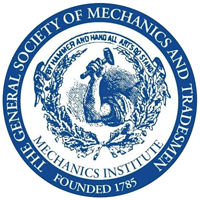Guide to the Records of the General Society of Mechanics and Tradesmen of the City of New York, 1785 -1955
Collection context
Summary
- Creator:
- General Society of Mechanics and Tradesmen of the City of New York
- Abstract:
- Minutes, reports, correspondence, ledgers, leases, legal documents, architectural drawings, publications, scrapbooks, photographs, and other records of the General Society of Mechanics and Tradesmen of the City of New York, The Mechanics and Traders Exchange, and the New York Mechanic and Scientific Institution.
- Extent:
- 76 Linear feet 38 boxes 334 volumes
- Language:
- English
Background
- Scope and content:
-
The Records of the General Society of Mechanics and Tradesmen of the City of New York consist of minutes, reports, correspondence, ledgers, leases, legal documents, architectural drawings, publications, scrapbooks, photographs, and other records of the General Society, The Mechanics and Traders Exchange, and the New York Mechanic and Scientific Institution. The collection supports research in the histories of such varied arenas as labor, education, culture, and philanthropy. The minutes of the General Members meetings are complete from 1785 through 1955, and the minutes of the General Society’s committees (which oversaw the charitable, educational, and other work of the Society) are generally complete from their inception through 1955. The records reveal the role of artisans, craftsmen, mechanics, and tradesmen in education, cultural and philanthropic endeavors in New York City. Materials date from the early American republic through the mid-twentieth century, and may be used to study politics, business history, war efforts, and social welfare. As an organization of craftsmen and builders, the collection sheds light on the history of work, the transformation of labor during the nineteenth and twentieth centuries, and the development of the physical environment of New York City. The Mechanics Institute and school committee minutes support research in the history of education and vocational training, and the library records provide information about the development of libraries and reading habits. The majority of records are in bound volumes. The eighteenth and nineteenth century records are handwritten in leather-bound minute books. Some are constructed with eighteenth-century English binding techniques. The elegance of these bindings reflects the importance of the craft of bookbinding to the organization, which included bookbinders, printers, and leatherworkers. Twentieth-century records were typed and pasted onto sheets bound in leather-covered sewn spring-back volumes, or collected in the bindings with metal mechanical leaf attachments. These bound volumes include minutes of the General Society’s governing body (referred to as General Members Meeting Minutes) and its various committees. The collection will also be of interest to genealogists and biographers. The membership records date to 1849, and pension records date to 1870. These records reveal the names, addresses, and occupations of hundreds of craftsmen in the city of New York. Also of interest are the Deceased Member Files, which contain detailed biographical information about members who died between 1897 and 1955. Information about early members may be found in the financial records and minutes. The membership of the General Society reflected the economic climate of the times and included those who prospered as well as those who worked in small shops. Members have included prominent men such as Peter Cooper, Andrew Carnegie, and Duncan Phyfe, as well as lesser known artisans.
- Biographical / historical:
-
The General Society was founded as a charitable organization in 1785 as a mutual aid society. During the past two centuries, it has provided philanthropic and educational programs for artisans and their families. The programs of the General Society include the Mechanics Institute and the Library. Founded in 1820 as a day school for the children of indigent members, the Mechanics Institute became a night school for adults in the building and construction trades in 1858. The Library was founded in 1820 as a self-help library for apprentices and grew to become the largest free library for working adults in New York City at the end of the nineteenth century.
- Arrangement:
-
Series : Text Date: 1785 - 1955
Series : Photographs Date: 1845 - 1955
Series : Media Date: 1900 - 1955
- Physical / technical requirements:
-
Open to qualified researchers. Photocopying is limited to stable, unbound material and undertaken by staff only.
- Rules or conventions:
- Describing Archives: a Content Standard
- Note:
-
Published citations should take the following form: Identification of item, date (if known); The Records of the General Society of Mechanics and Tradesmen of the City of New York; box number (if applicable); folder number (if applicable); General Society of Mechanics and Tradesmen of the City of New York 20 West 44th Street New York, NY 10036
Indexed terms
- Subjects:
-
Adult education
Adult education of women
Artisans
Building
Building trades
Construction industry
Dinners and dining
Education (Elementary)
Fraternal organizations
Lectures and lecturing
Libraries
Mechanics' institutes
Moral education
Occupational training
Nonprofit organizations
Philanthropy libraries
Skilled labor
Society libraries
Technical education - Names:
-
General Society of Mechanics and Tradesmen of the City of New
York
General Society of Mechanics & Tradesmen of The City Of New York
General Society of Mechanics and Tradesmen of the City of New York
Access and use
- Restrictions:
-
Permission to quote from this collection in a publication must be requested and granted in writing. Send permission requests to: Director of the Library and Archives The General Society of Mechanics and Tradesmen 20 West 44th Street New York, NY 10036
- Terms of access:
-
Permission to quote from this collection in a publication must be requested and granted in writing. Send permission requests to: Director of the Library and Archives The General Society of Mechanics and Tradesmen 20 West 44th Street New York, NY 10036
- Location of this collection:
-
20 West 44th StreetNew York, NY 10036, United States
- Contact:
- 212.840.1840victoria.dengel@generalsociety.org

